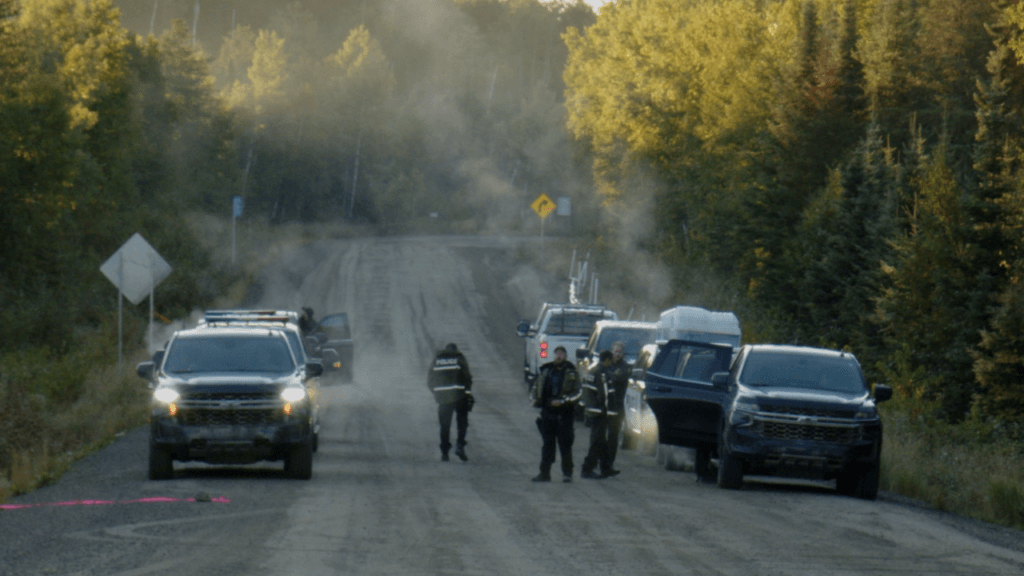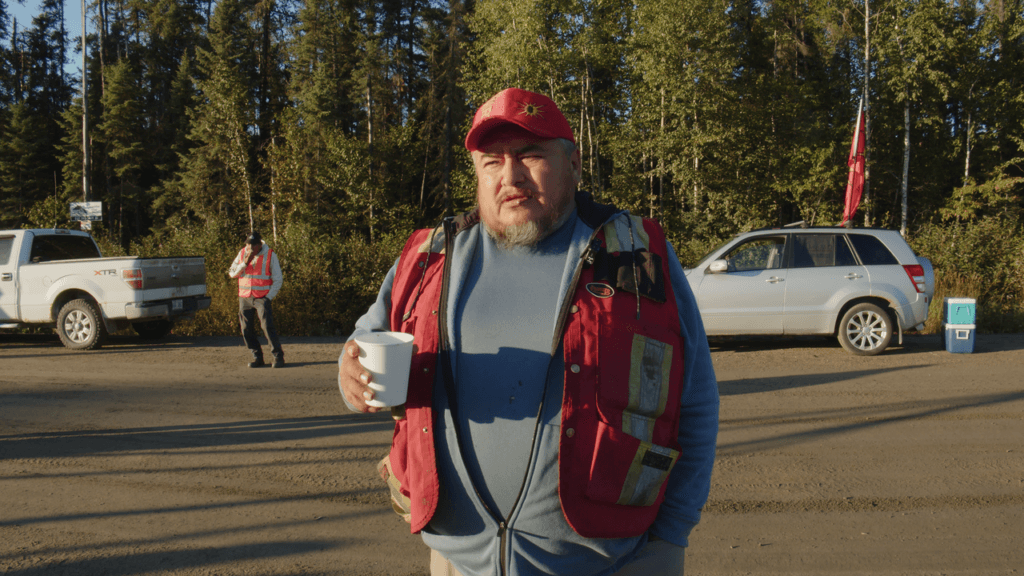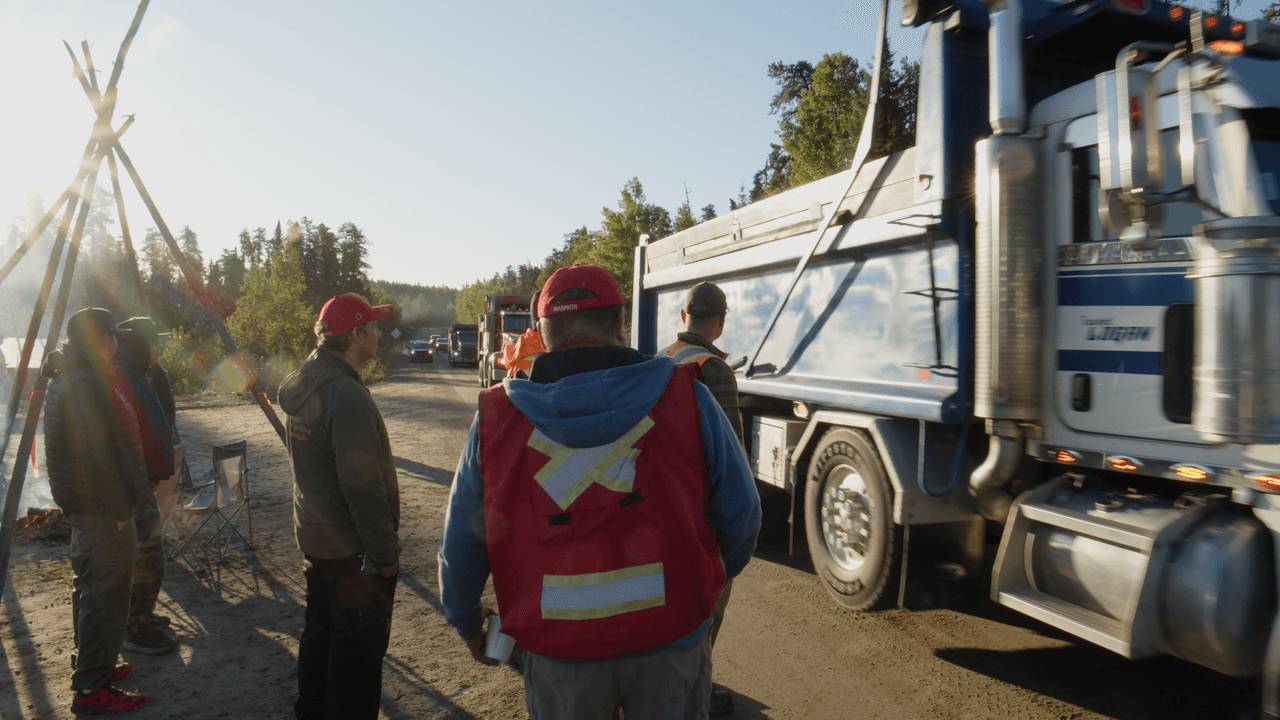A confrontation between personnel of forestry giant Rémabec and forest defenders was narrowly avoided earlier this week. A forestry entrepreneur had threatened to mobilize colleagues to breach forest blockades near Wemotaci, an Atikamekw reserve in the Mauricie region of central Quebec.
For several months, a group of residents of Wemotaci and allies have maintained blockades to prevent logging operations and assert sovereignty over their lands. On Friday evening, logging entrepreneur Dany Grenier made a Facebook post calling on colleagues in the forestry sector to join him in “asserting their rights” to resume cutting the following Monday morning.
“They’re threatening to come take control of the territory, and we’re trying to stop them, so we called on the population for support,” Valeska Tastapapi, an indigenous land defender, told The North Star at the blockade on Sunday night.
Tastapapi was one of dozens of indigenous land defenders and allies who assembled at the 60-kilometre marker of Route 25 on Sunday, August 17. “When families are being threatened like this, it’s certain that many people are going to stand up,” she said.
In the end, a confrontation was avoided when Rémabec, the parent company of many forestry businesses in the area, as well as Quebec’s provincial police, dispatched people to the area to prevent forestry workers from confronting the blockade.

“The bosses came in the morning to get the workers who absolutely want to pass to turn around and leave,” explained Dave Petiquay, spokesperson for the MAMO First Nations group. “With the amount of people we were, they must’ve been scared that there’d be a commotion, that the relation between forestry workers and indigenous people would worsen.”
In a diplomatically worded statement, Rémabec told its subsidiaries to stand down and called on the provincial government to intervene to “end the tensions” and “facilitate discussions toward a mutually beneficial agreement.”
The mayor of La Tuque, a forestry hub near Wemotaci, was less inclined to mince words. “We have laws in Quebec. We have the CN police, the Royal Canadian Mounted Police, and the provincial police. With three services, they are capable of getting [the blockades] out of there,” said mayor Luc Martel.
“[The duration of the blockade] will depend on the loggers, but we will definitely have to move on, as well. There are other problematic areas that will also need to be dealt with,” said Petiquay. “With what we’re doing now, there’s no more logging in the sector, but in some places in the Wemotaci territory there’s still logging, and in Manawan, too.

Quebec Bill 97
Blockades at Wemotaci and on several other Quebec reserves have been spearheaded by hereditary chiefs and other members of the organization MAMO First Nation, an alliance of Atikamekw, Innu and Abenaki forest defenders which was formed in April in response to Quebec Bill 97.
The controversial bill, proposed by the provincial minister of natural resources and forests Maïté Blanchette Vézina, aims, in typical CAQ fashion, to “modernize” forestry management in the province.
It seeks to divide forests into three zones:
- Areas that are intended for intensive forestry operations
- Areas that allow for mixed use, such as forestry, conservation or recreational activities
- Protected areas for maintaining ecosystems
Critics of the bill denounce that a third of the forests would be reserved for private interests, giving them total control over these lands to exploit for profit.
Lucien Wabanonik, Chief of the Anishnabe Council of Lac-Simon, told CBC that “This measure is a direct provocation to our members in the territory.” He adds, “What the bill is telling them is: ‘We tolerate you by not prohibiting your traditional activities, but under no circumstances or pretext should you interfere with logging operations, which take precedence over your rights.’”
Bill 97 was tabled amidst a flurry of new legislation across the country that would expand resource extraction operations and “streamline” the approval process for new projects.
For example, the “Protect Ontario by Unleashing Our Economy Act”, passed in June, opens several regions of Northern Ontario to resource development. That law was characterized by Ontario Regional Chief Abram Benedict described as “a direct threat” to First Nations, their lands, jurisdiction, and sovereignty.
Also in June, Mark Carney’s Liberals were backed by the Conservatives in passing the One Canadian Economy Act. This law removes regulations and requirements related to infrastructure and resource extraction projects. Kebaowek First Nation Chief Lance Haymond called the process leading to that bill “a case study in how not to engage with Indigenous nations.”


Be part of the conversation!
Only subscribers can comment. Subscribe to The North Star to join the conversation under our articles with our journalists and fellow community members. If you’re already subscribed, log in.